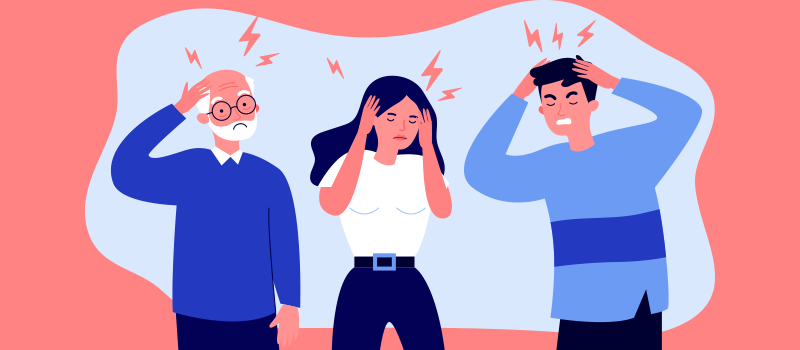What’s the Buzz
The Bee Healthy Blog
6 Most Common Medications to Treat Neurological Disorders

Neurological disorders are conditions that affect the brain, spinal cord (central nervous system), and the nerves distributed throughout the body. They include a wide range of conditions such as attention deficit hyperactivity disorder (ADHD), Alzheimer’s disease, Bell’s palsy, brain tumors, traumatic brain injuries, carpal tunnel syndrome, cerebral aneurysms, diabetic neuropathy, epilepsy, and essential tremor. They also include movement disorders like Parkinson’s disease, mild cognitive impairment, migraine, multiple sclerosis, myasthenia gravis, amyotrophic lateral sclerosis (ALS), stroke, muscular dystrophy (progressive muscle weakness), and many more. More than 600 neurological diseases are known to affect humans.
Some neurological conditions occur as side effects of medications, for example, drug-induced movement disorders like tremors, neuroleptic malignant syndrome (NMS), serotonin syndrome (serotonin excess), permanent cerebellar syndrome, tardive dyskinesia, and other tardive syndromes.
Please continue reading to learn more about some medications used to treat common neurological disorders.
What is the most common treatment for neurological conditions?
Treatment for a neurological condition depends on what is being treated. Each drug therapy is specialized for specific illnesses. For example, drug therapy could include medications given through pumps or implantable devices (such as with deep brain stimulators and spinal cord stimulators). Some therapies are as straightforward as brain surgery or physical therapy.
Fortunately, many different healthcare professionals provide care for people with neurological problems, such as neurologists, neurosurgeons, psychiatrists, vascular surgeons, radiologists, primary care physicians, nurse practitioners, and physical and occupational therapists, just to name a few.
What medications are used to treat disorders of the central nervous system and nerves?
Some of the medications commonly prescribed to treat neurological disorders are listed below.
Anticonvulsants
The CDC estimates that approximately 3.4 million Americans have active epilepsy (seizures). Anticonvulsants such as levetiracetam (Keppra), topiramate (Topamax), lamotrigine (Lamictal), oxcarbazepine (Trileptal), and divalproex sodium (Depakote) are some of the most commonly prescribed neurological medications. Possible side effects of these drugs include nausea, vomiting, double vision, drowsiness, headache, and liver damage.
Newer anticonvulsants like gabapentin (Neurontin) and pregabalin (Lyrica) have fewer side effects. They are used to treat nerve pain, such as that caused by diabetic neuropathy or postherpetic neuralgia.
Parkinson’s disease medications
Drugs used to treat Parkinson’s disease, such as carbidopa and levodopa, can help patients with this condition function better. These medications increase the amount of dopamine available to the brain. Other neurological medications used to treat symptoms like muscular rigidity in Parkinson’s patients include dopamine agonists like pramipexole (Mirapex), ropinirole (Requip), and rotigotine (Neupro).
Note that certain antipsychotic drugs can cause extrapyramidal symptoms as side effects. These symptoms can resemble Parkinson’s disease symptoms and the risk of them occurring increases at high doses. Your doctor may treat Parkinsonian symptoms by lowering the dose of the causative agent (an antipsychotic drug), changing to other drugs, or using anti-Parkinson’s drugs to treat specific symptoms. Patients treated with newer atypical antipsychotics like clozapine, quetiapine, and olanzapine are less likely to develop such an adverse effect.
Medications used to treat dementia
Neurological medications called cholinesterase inhibitors, such as donepezil (Aricept), galantamine (Razadyne), and rivastigmine (Exelon), are used to treat Alzheimer’s disease, dementia with Lewy bodies, and Parkinson’s dementia. Adverse effects of these drugs include nausea, diarrhea, headache, and insomnia.
Antidepressants
Different types of antidepressants, including selective serotonin reuptake inhibitors (SSRIs), tricyclic antidepressants, and monoamine oxidase inhibitors, are commonly prescribed neurological medications. The CDC estimates that approximately 13% of the population, or 1 in 8 Americans takes an antidepressant.
Beta blockers
Beta blockers such as propranolol are used to treat high blood pressure. However, this medication is also prescribed to treat patients with medical conditions affecting the nervous system, for example, essential tremors and migraine headaches.
Thrombolytics
This group of medications, also called blood thinners, is used to dissolve blood clots blocking the blood supply to the heart, lungs, brain, or legs. Examples include alteplase (t-PA), reteplase, urokinase, prourokinase, tenecteplase, anistreplase, and streptokinase.
Of note: Certain medications can lead to an increased risk of blood clots. For example, the incidence of blood clots, cerebrovascular disease, and stroke is higher in women who take oral contraceptives and hormone replacement therapy. Lifestyle changes like weight loss, diet, smoking cessation, and exercise can help lower this risk.
Wrapping up
Many effective medications are available to treat conditions affecting the central nervous system and peripheral nerves. To get the maximum benefit from neurological medications, give your doctors a detailed drug history, including previously tried medications and your response to them. Also, give your healthcare providers a complete list of your current medications, including prescription drugs, over-the-counter medicines, dietary supplements, and herbal products. This will help avoid drug interactions between your medications.
References:
- https://www.disabled-world.com/health/neurology/disorders-list.php
- https://medlineplus.gov/ency/article/007456.htm#
- https://www.ncbi.nlm.nih.gov/pmc/articles/PMC6478951/
- https://www.definitivehc.com/resources/healthcare-insights/top-fda-approved-drugs-neurologists
- https://www.cdc.gov/epilepsy/data/index.html
- https://www.mayoclinic.org/diseases-conditions/peripheral-neuropathy/in-depth/pain-medications/art-20045004#
- https://www.parkinson.org/living-with-parkinsons/treatment/prescription-medications/dopamine-antagonists
- https://pubmed.ncbi.nlm.nih.gov/11772117/
- https://pubmed.ncbi.nlm.nih.gov/1359485/#
- https://www.ncbi.nlm.nih.gov/books/NBK544336/#
- https://www.cdc.gov/nchs/products/databriefs/db377.htm
- https://my.clevelandclinic.org/health/treatments/23238-thrombolytics#
- https://jnnp.bmj.com/content/75/suppl_3/iii2












SOCIAL